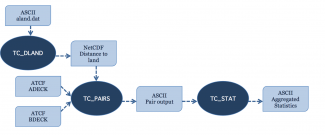Model Evaluation Tools – Tropical Cyclone (MET-TC) was first developed in 2012 by the Developmental Testbed Center (DTC) as part of the Hurricane Forecast Improvement Project (HFIP) to provide a set of tools to aid in tropical cyclone forecast evaluation and verification. The primary goal of MET-TC was to replicate the functionality of the National Hurricane Center (NHC) verification software while utilizing the modular tools available within the MET software framework. The MET-TC software was first released with METv4.1, making the tools available to all users and enabling consistent forecast evaluation studies to be undertaken across the tropical cyclone modeling community. The initial tools provided a standard set of verification metrics and comprehensive output statistics with flexibility for user-defined stratification, which can be used for homogeneous comparisons of operational and experimental track and intensity forecasts. Graphical capabilities are also included with MET-TC, allowing easy visualization of verification statistics. Since the initial release, the tools have expanded through several DTC and non-DTC projects. Notable additions include:
- Rapid Intensification (RI) verification capabilities with user-defined thresholds (rirw)
- Ability to read Automated Tropical Cyclone Forecast (ATCF) Probability/Error Data Files (e-decks) and apply probabilistic methods to RI probabilities (-edeck, probrirw)
- Masking according to track and a circle of configurable radius around one or more lat/lon locations (gen_vx_mask)
- Application to shift gridded data field by source and destination lon/lat values (shift_data_plane)
- Feature-relative evaluation (METplus application)
New development is on the horizon to further enhance the tropical cyclone verification capabilities within the METplus system, these include:
- A new tool to convert model output to storm-relative coordinates and allow users to normalize by radius of maximum winds, compute azimuthal averages, derive tangential and radial wind (tc-rmw)
- A new tool to verify deterministic and probabilistic tropical cyclone genesis forecasts (tc-gen)
- Support for reading Statistical Hurricane Intensity Prediction Scheme (SHIPS) diagnostics files
